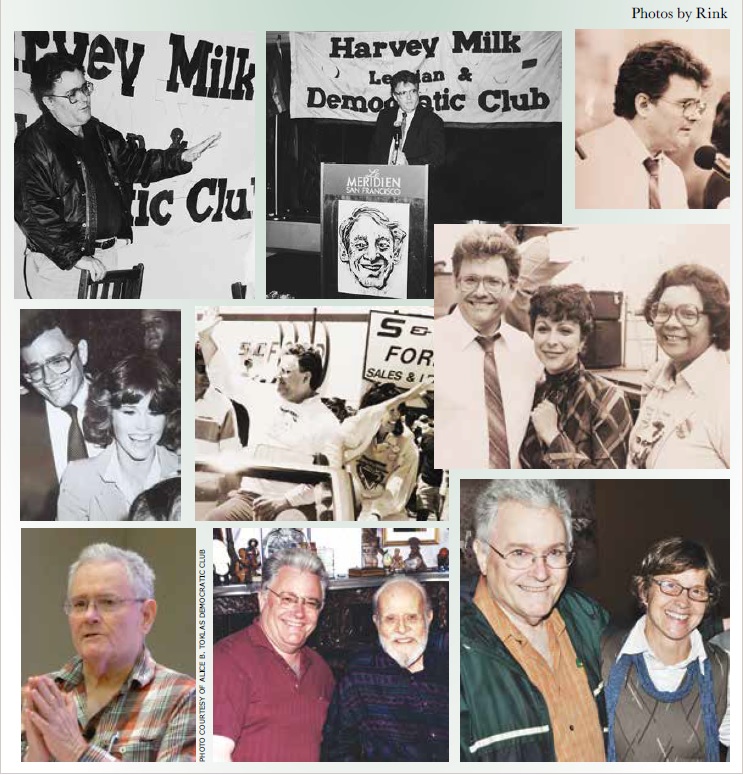
By John Lewis and Stuart Gaffney–
On June 24, the LGBTIQ movement lost one of its greatest unsung heroes, Harry Britt. As not nearly enough people know today, Harry Britt took up the mantle of LGBTIQ leadership on the San Francisco Board of Supervisors in January 1979, succeeding Harvey Milk after Milk and San Francisco Mayor George Moscone were murdered by former Supervisor Dan White. Indeed, Milk had specifically named Britt as one of the people he wished to succeed him if he were assassinated in office.
When Britt assumed Milk’s seat in the wake of the horrific tragedy, he himself became one of the very first openly gay public officials in the nation. Britt went on to win election to the Board four times. In 1988, he made history by becoming the Board’s first openly gay President when he won the most votes of any Supervisorial candidate at a time when elections were citywide. Britt’s victory marked a watershed in LGBTIQ electoral politics and inspired numerous other queer candidates to pursue and win elected office.
The year before in 1987, Britt had sought to do something even more monumental: become the first member of Congress to run as an openly gay man with the specific intention of giving LGBTIQ people “our ownvoice” in Congress, as he put it in his campaign literature.
In spring 1987, San Francisco had an open seat in Congress because of the untimely death of Representative Sala Burton. Britt, along with 12 other hopefuls, faced a formidable challenge in the quick special election against an experienced Democratic Party official who was largely unknown to the general public: Nancy Pelosi. Pelosi entered the race with a double-digit lead in the polls and far outpaced her rivals in terms of establishment support and fundraising.
But something remarkable occurred. An extraordinary grassroots campaign arose to support Britt. In a 1987 Mother Jones piece, Britt described how his campaign “became a magnet for progressive causes.” He won the endorsement of the Sierra Club and the support of numerous other environmental, labor, and left-leaning organizations. Britt recognized that “[c]entral to [his] campaign was an unprecedented effort by lesbians and gay men,” although Pelosi herself garnered significant lesbian and gay support, too.
On the evening of March 17, Ben Schatz, then an attorney with National Gay Rights Advocates and now of Kinsey Sicks fame, held a house party for Britt, which ended up changing our lives forever. We, in fact, met at that party, when Ben introduced us and we shook hands right over the fruit bowl, a seemingly perfect place for two 20-something politically minded, idealistic gay men to meet. We ended up being the last guests to leave that evening and have been together ever since.
At the party, former State Senator Carole Migden, then Chair of the San Francisco Democratic Party, told those gathered that we had a rare opportunity with Britt to elect a truly progressive, openly gay man to Congress. With the election taking place at the height of the HIV/AIDS epidemic in San Francisco, Britt’s campaign emphasized his years of experience in the face of relentless adversity as one of the most effective leaders in the battle against what Britt termed a “terrifying disease.”
Britt had also been a visionary on same-sex partner recognition, introducing and then winning passage of domestic partner legislation way back in 1982. The law would have been the first in the nation had then-Mayor Dianne Feinstein not vetoed it. Britt later wrote San Francisco’s domestic partnership law that was passed by initiative in 1990.
Shortly before election day, the San Francisco Sentinel reported that “Britt had pulled even” in the polls. But in the end, Pelosi narrowly defeated Britt by 3.5 percentage points. With Britt’s campaign gaining momentum as the campaign went on, political experts speculated at the time that Britt might have won the race if the election had been held just a week later.
Perhaps Britt’s boldest statement of his career was his powerful pronouncement of gay resolve the morning after the so-called “White Night Riots” that erupted after a jury convicted Dan White merely of manslaughter for the cold-blooded assassination of both Milk and Moscone. Britt proclaimed: “Harvey Milk’s people do not have anything to apologize for. Now the society is going to have to deal with us not as nice little fairies who have hairdressing salons, but as people capable of violence. We’re not going to put up with Dan Whites anymore.”
Although we do not condone violence, the fearless commitment of LGBTIQ people to our freedom, dignity, and equality that Britt articulated 41 years ago undergirds all that came after it and all that will come in the future. Harry Britt will always sing in our hearts.
John Lewis and Stuart Gaffney, together for over three decades, were plaintiffs in the California case for equal marriage rights decided by the California Supreme Court in 2008. Their leadership in the grassroots organization Marriage Equality USA contributed in 2015 to making same-sex marriage legal nationwide.

Published on July 16, 2020
Recent Comments